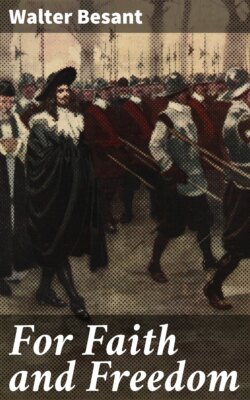Читать книгу For Faith and Freedom - Walter Besant - Страница 20
На сайте Литреса книга снята с продажи.
A ROYAL PROGRESS.
ОглавлениеTable of Contents
When all the boys were gone the time was quiet, indeed, for those who were left behind. My mother's wheel went spinning still, but I think that some kindness on the part of Mr. Boscorel as well as Sir Christopher caused her weekly tale of yarn to be of less importance. And as for me, not only would she never suffer me to sit at the spinning-wheel, but there was so much request of me (to replace the boys) that I was nearly all the day either with Sir Christopher, or with Madam, or with Mr. Boscorel.
Up to the year 1680, or thereabouts, I paid no more attention to political matters than any young woman with no knowledge may be supposed to give. Yet, of course, I was on the side of liberty, both civil and religious. How should that be otherwise, my father being such as he was, muzzled for all these years, the work of his life prevented and destroyed?
It was in that year, however, that I became a most zealous partisan and lover of the Protestant cause in the way that I am about to relate.
Everybody knows that there is no part of Great Britain (not even Scotland) where the Protestant religion hath supporters more stout and staunch than Somerset and Devonshire. I hope I shall not be accused of disloyalty to Queen Anne, under whom we now flourish and are happy, when I say that in the West of England we had grown—I know not how—to regard the late misguided Duke of Monmouth as the champion of the Protestant faith. When, therefore, the Duke came into the West of England in the year 1680, five years before his rebellion, he was everywhere received with acclamations and by crowds who gathered round him to witness their loyalty to the Protestant faith. They came also to gaze upon the gallant commander who had defeated both the French and the Dutch, and was said (but erroneously) to be as wise as he was brave, and as religious as he was beautiful to look upon. As for his wisdom, those who knew him best have since assured the world that he had little or none, his judgment being always swayed and determined for him by crafty and subtle persons seeking their own interests. And as for his religion, whatever may have been his profession, good works were wanting—as is now very well known. But at that time, and among our people, the wicked ways of Courts were only half understood. And there can be no doubt that, whether he was wise or religious, the show of affection with which the Duke was received upon this journey, turned his head and caused him to think that these people would rally round him if he called upon them. And I suppose that there is nothing which more delights a Prince than to believe that his friends are ready even to lay down their lives in his behalf.
At that time the country was greatly agitated by anxiety concerning the succession. Those who were nearest the throne knew that King Charles was secretly a Papist. We in the country had not learned that dismal circumstance; yet we knew the religion of the Duke of York. Thousands there were, like Sir Christopher himself, who now lamented the return of the King, considering the disgraces which had fallen upon the country. But what was done could not be undone. They, therefore, asked themselves if the nation would suffer an avowed Papist to ascend a Protestant throne. If not, what should be done? And here, as everybody knows, was opinion divided. For some declared that the Duke of Monmouth, had he his rights, was the lawful heir; and others maintained, on the King's own words, that he was never married to Mistress Lucy Waters. Therefore, they would have the Duke of York's daughter, a Protestant princess, married to William of Orange, proclaimed Queen. The Monmouth party were strong, however, and it was even said—Mr. Henry Clark, minister of Crewkerne, wrote a pamphlet to prove it—that a poor woman, Elizabeth Parcet by name, touched the Duke (he being ignorant of the thing) for King's Evil, and was straightway healed. Sir Christopher laughed at the story, saying that the King himself, whether he was descended from a Scottish Stuart or from King Solomon himself, could no more cure that dreadful disease than the seventh son of a seventh son (as some foolish people believe), or the rubbing of the part affected by the hand of a man that had been hanged (as others do foolishly believe), which is the reason why on the gibbets the hanging corpses are always handless.
It was noised abroad, beforehand, that the Duke was going to ride through the West Country in order to visit his friends. The progress (it was more like a Royal progress than the journey of a private nobleman) began with his visit to Mr. Thomas Thynne, of Longleat House. It is said that his chief reason for going to that house was to connect himself with the obligation of the tenant of Longleat to give the King and his suite a night's lodging when they visited that part of the country. Mr. Thynne, who entertained the Duke on this occasion, was the same who was afterwards murdered in London by Count Konigsmark. They called him 'Tom of Ten Thousand.' The poet Dryden hath written of this progress, in that poem wherein, under the fabled name of Absalom, he figures the Duke:—
